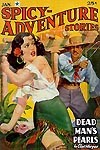 I can imagine your breath catching when you first saw the title of this blog post. That’s not like Sidney, critiquing the racy stuff, commenting on…well who knows what? If you were born, or just became a young adult after WW II, your reaction to the label ‘Pulp Fiction’ is predictable, and undoubtedly much the same as mine; but we’re all wrong. Researching newspapers at the turn of the 20th century for a new novel brought me unexpectedly to a review of the birth of pulp fiction in the early 1900s; not something I can use for the novel I’m working on, but fascinating anyway. I quickly saw where my misconceptions had come from.
I can imagine your breath catching when you first saw the title of this blog post. That’s not like Sidney, critiquing the racy stuff, commenting on…well who knows what? If you were born, or just became a young adult after WW II, your reaction to the label ‘Pulp Fiction’ is predictable, and undoubtedly much the same as mine; but we’re all wrong. Researching newspapers at the turn of the 20th century for a new novel brought me unexpectedly to a review of the birth of pulp fiction in the early 1900s; not something I can use for the novel I’m working on, but fascinating anyway. I quickly saw where my misconceptions had come from.
Pulp fiction was so called because the paper the stories were printed on was made of the cheapest pulp to save money, making the magazines easily accessible to an increasing number of literate young readers. There were many different genres, but the adventurous, fantastic qualities they all described offered wondrous escape for many with little exposure to travel and excitement. Remembering that there were no TV shows coming into people’s homes on a daily basis, the mass appeal of these adventure-packed stories is certainly understandable, and their influence on our entertainment culture even today was spearheaded by such authors as Ray Bradbury, Raymond Chandler and Dashiell Hammett. They all started their writing careers in ‘The Pulps’. WW II brought a shortage of all paper, pulp or otherwise, and apparently tastes changed as well due to the abundance of real life terror that took the place of fictitious fears. ‘The Pulps’ lost their hold on the public, but their legacy can still be found in the plots, fantasies and heroes of today’s popular entertainment.
Understanding now why I inherited the Pulp Fiction mentality even without personal exposure to the real thing, I began to wonder about the power behind the thrust of those adventures. They were different; freer, and available to everyone, so the sharing of the stories probably became the equivalent of a much-discussed TV episode around the water cooler. But I suspect there was more to it. You can still find some of them on the internet, so go see for yourself. Initially I was drawn to the sense of adventure and excitement, but I soon realized it was more than a gratuitous whipping up of adrenalin they offered. Instead of fluffing up the plots and characters with a lot of unnecessary hype, it almost seemed as if they condensed each situation down to its essential fiber, each character to his or her flesh. Wait a minute…fiber, flesh, condensed, this is beginning to sound like pulp all over again.
The other day I was cutting up a chapter from my second novel, Certain Liberties, for a reading that could run no more than five minutes. I’ve done it many times, and I enjoy the process. It’s much like playing a game, and it’s fun. But this time I realized it was more than that. The finished product brought out things I hadn’t noticed in the novel. It morphed into a sharper, cleaner, more exciting view of the original scene. It was like squeezing out all the juice and being left with the fibrous pulp alone. I was so pleased with the changes I made for the reading, I went back to incorporate them into the original. But I soon found what worked for two pages didn’t work for two-hundred. I love the process and exciting results of ‘juicing’ one of my novels to extract the pulp for a short reading. But I also appreciate the density and fulfillment of the complete offering as a booklover would, too.
So I think I’ll call my readings ‘Pulp Fiction’ in the future, ‘juicing’ the longer version to ‘flesh it out’, as detectives of the earlier stories would have said. Which makes me wonder if ‘Pulp Fiction’ wasn’t more about dense plots and gritty characters than cheap paper.
